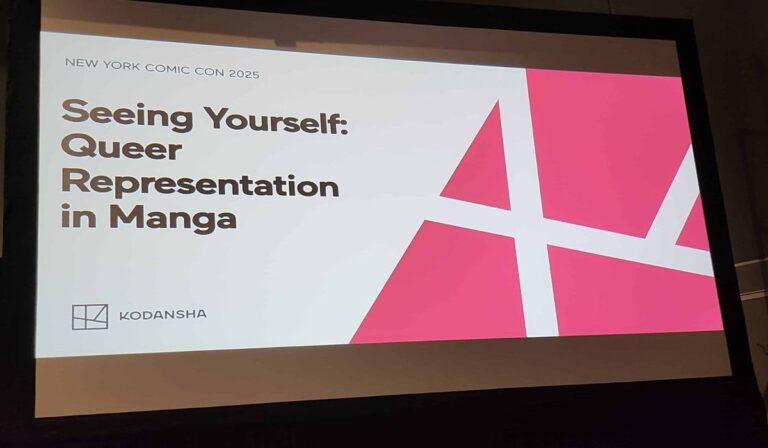On Saturday, October 11th, Kodansha’s “Seeing Yourself: Queer Representation in Manga” panel began at 4:15 and was moderated by Ivan Salazar of Kodansha Sales and Marketing. The panel discussion included TJ Ferentini (senior editor at Kodansha), Gigi Murakami (creator of the VIZ original one-shot Resenter), and Morgan Perry (marketing manager at Square Enix).
Perry was delayed in traffic on her way home from Kodansha House in SoHo, so the panel discussion began without her. The panel discussion began with words from sponsor Kodansha, who introduced several new releases and Kodansha House, a pop-up event space and manga library. Salazar then moved on to define media literacy and why it’s important, summarizing it as the ability to go beyond surface-level presentation to critically analyze text and understand deeper themes.
The first question to the panelists was, “How and where have you seen yourself in comics?” Murakami responded with Poppy Pesuyama’s How I Loved Myself, a two-volume autobiographical manga about a manga artist’s journey to understanding his non-binary identity and dealing with sexual harassment in the workplace. Murakami said he had many similar experiences to Pesuyama during his college and high school days, and was still exploring their gender identity.
Mr. Ferentini answered questions with the manga “Boys Run the Riot,” by Keito Gaku, which was so popular in the United States that a sequel was chosen for the American edition of Young Magazine. (If you want to know more, don’t forget to vote for serialization!) Ferentini said, “If this had been published when I was younger, I would have understood myself sooner.” Salazar said the gender journey often comes with many questions and doubts.
Ms. Salazar chose Kabi Nagata’s “My Lesbian Experience with Loneliness,” and said that she could relate to Kabi’s story of self-medicating with alcohol and food to cure her pain. Perry was still late, but her choice was “Is Love The Answer?” Uta Isaki appeared in the presentation without comment.
When asked which character he sees himself in now, Murakami answered Nana Ozaki from Ai Yazawa’s Nana, and said it was related to his deep and passionate friendship with Nana Komatsu. “And she’s kissed quite a few girls. I’ve kissed quite a few girls, too,” Murakami said, drawing laughter from the audience.
Ferentini said this about Muneyuki Kinjo and Yusuke Nomura’s “Blue Rock” Leo Mikage. “Purple hair, very dramatic, and his relationship with his friends is something I can really relate to.” Leo’s fierce possessiveness and jealousy of friendships resonated with Ferentini. Salazar mentioned Ryuji Ayukawa, also known as Yuka-chan, from “Blue Period” by Tsubasa Yamaguchi. Yuka is rejected by her family for who she is, and Salazar is afraid of that. Perry’s answer was Freelen: Beyond the Journey’s End by Kaneto Yamada and Tsukasa Abe.
The panelists also discussed which works they felt best represented gender and sexuality, and which featured characters they could relate to. Murakami cited George Morikawa’s Hajime no Ippo, Kentaro Miura’s Berserk, and Kame Shirahama’s Atelier of the Pointed Hat as examples of different types of masculinity and desire. Mr. Ferentini said that Mr. Pom’s “Senior is a Man’s Daughter”, Mr. Kurano’s “I Cross-Dressed at an IRL Exchange Party”, and Rei Taki’s “Last Gender” were the first manga he read that featured pansexual characters. Salazar recommended Shuzo Oshimi’s “Okaeri,” Alice, Kyu Hayashida’s “Dorohedoro,” and Mokuren’s “Hikaru Natsu.”
With five minutes left in the panel, Perry burst in breathlessly and introduced her recommendation at just the right moment. These are “Adult Complex” by Taku Nomomura, “On and Off: Work-Life Imbalance” by Shinnosuke Kanazawa, and “My Dress Up Darling” by Shinichi Fukuda. In her choices, she referenced the common theme of gender nonconformity through fashion.
Salazar’s final takeaway from the panel discussion is that knowing yourself is a revolutionary act. Comics can be a way for marginalized people to find language and frameworks that help them understand their identities.
“Is this my final form? Is there such a thing as a final form?” Ferentini said.
Stay tuned to The Beat for more coverage of NYCC ’25.
Something like this:
Like loading…


